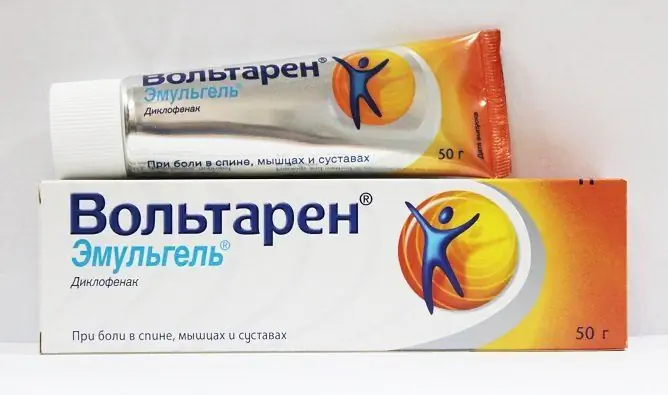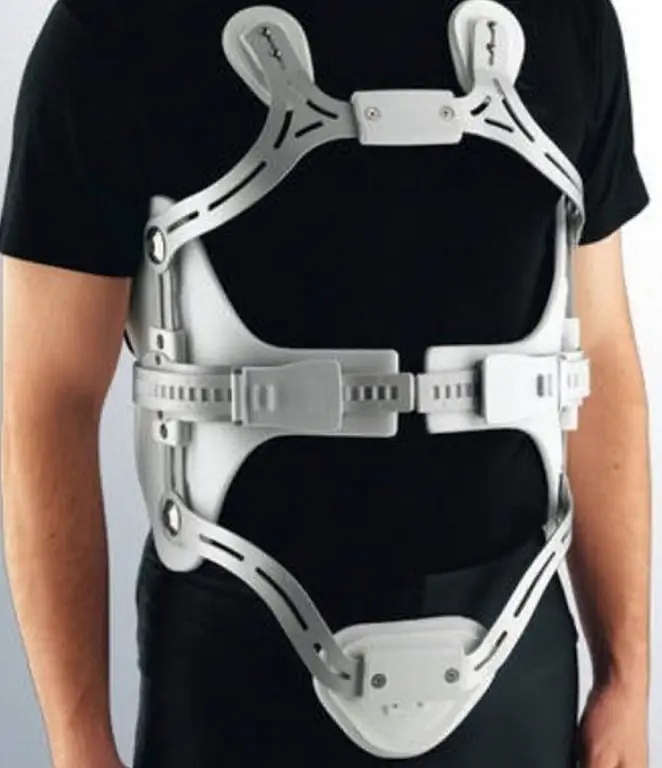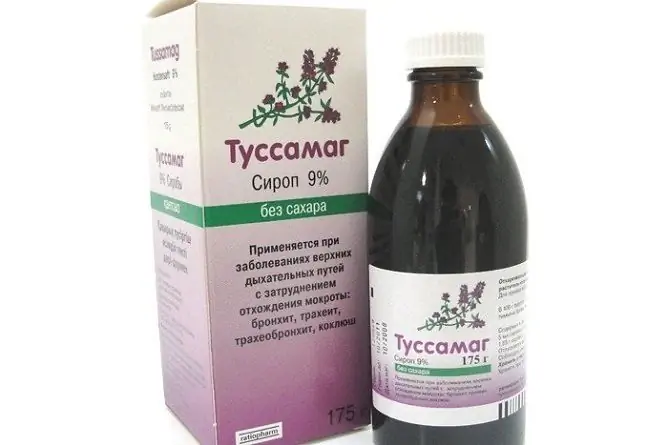- Author Rachel Wainwright wainwright@abchealthonline.com.
- Public 2023-12-15 07:39.
- Last modified 2025-11-02 20:14.
Chondroprotectors for osteochondrosis and other treatment methods
The content of the article:
-
The action of chondroprotectors in osteochondrosis of the spine
- Chondroitin
- Glucosamine
- The composition of chondroprojectors and their types
- Contraindications
- Side effects
- Reviews
-
Other treatments for the disease
- Non-drug therapy
- Drug treatment
-
General information about osteochondrosis
- Symptoms
- The reasons
- Video
Chondroprotectors for osteochondrosis are prescribed as part of complex therapy, they are used to slow down or stop degenerative-dystrophic processes in the cartilage tissue, to prevent a decrease in its elasticity. Medicines from this group differ in composition, release forms, mechanism of action.
Some experts express doubts about the effectiveness of the use of these funds for osteochondrosis of the spine.

Teraflex is a chondroprotective agent for oral administration
The list of medicines most suitable for the treatment of the disease will be provided by the attending physician, depending on the cause of the development of the pathology, the existing symptoms, contraindications and other factors. He must also prescribe the dosage of drugs and the duration of therapy. Self-medication for osteochondrosis can worsen the patient's condition. In addition, fruitless attempts can lead to wasted time and the subsequent treatment will be longer and more difficult.
The action of chondroprotectors in osteochondrosis of the spine
Chondroitin and glucosamine preparations are not able to completely cure the disease, however, in combination with other medications and treatment methods, they can stop the process of destruction of cartilage tissue and even partially restore it.
Chondroitin
Chondroitin preparations affect the cartilage tissue through the synovial fluid (the mass that fills the joint cavity), due to the fact that it is absent between the vertebrae.
Presumably, drugs in this group can also have anti-inflammatory and analgesic effects. Their use in combination with analgesics allows you to reduce the dosage of the latter. Combination drugs can be used, which consist of chondroprotectors and non-steroidal anti-inflammatory drugs.
Glucosamine
Glucosamine is able to restore the structural elements of cartilage and prevent its destruction.
The composition of chondroprojectors and their types
The composition of the preparations of the chondroprotective group may include not only chemicals, but also an extract from the bone marrow of cattle, from the cartilaginous tissue of marine fish, avocado extract and other biologically active substances.
Depending on the method of application, chondroprotectors are divided into several groups, which are presented in the table.
| Group of drugs | Names |
|
Oral preparations (capsules, tablets) |
Teraflex, Piaskledin (popular chondroprotectors for osteochondrosis of the lumbar spine) |
| Injectable drugs | Rumalon, Arteparon |
| Preparations for external use (ointments, gels) |
Chondroxide, Artrafic (popular chondroprotectors for osteochondrosis of the cervical spine) |
The course of therapy can be 2-3 months. The therapeutic effect usually does not appear immediately, but after a while. To consolidate the effect, it may be necessary to use chondroprotectors for 6 months. After the end of the course of treatment, it may be necessary to repeat it after several months.
To enhance the effect, drugs of the same group can be prescribed in various dosage forms (injections, tablets, ointments). The course of treatment may begin with injections, after which the patient may need to take pills. At the same time, topical agents can be used.

Rumalon - chondroprotector for injection
Contraindications
Most of the new generation chondroprotectors have a minimum of contraindications. Absolute contraindications include the presence of individual intolerance to the components of the drug and phenylketonuria in the patient.
Medicines should be used with caution during childbearing and lactation, as well as if the patient has diseases of the digestive tract (requires agreement with the doctor).
Side effects
When using chondroprotective drugs, an allergic reaction may occur, in rare cases, there is pain in the abdomen, diarrhea or constipation, bloating, headache, swelling of the lower extremities, sleep disturbances, tachycardia.
Reviews
According to doctors, the result of the treatment of spinal osteochondrosis with chondroprotectors depends on the stage of the disease. The earlier the pathology was discovered and treatment started, the more effective it will be. Cartilage can be restored if it is not completely destroyed, therefore, chondroprotectors show good results precisely at the early stages of the development of pathology.
Chondroprotective drugs are usually well tolerated by patients and are suitable for long-term use.
Other treatments for the disease
Non-drug therapy
Conservative treatment of osteochondrosis is aimed at relieving pain, dysfunctions of the spinal nerves, preventing further degenerative changes in the spine.
When using chondroprotectors, it is important to restore the diffuse nutrition of the cartilage (otherwise the delivery of the active substance to the damaged cartilaginous tissue is difficult), which in many cases can be achieved with the help of exercise therapy. Therapeutic exercises for this pathology is aimed at strengthening the muscle corset, improving blood circulation and metabolism, and reducing the load on the spinal column. In addition, the doctor may prescribe massage, acupuncture. A balanced diet and drinking regimen is recommended.
From physiotherapeutic methods, the impact on the affected area with low-frequency currents, magnetotherapy, ultrasound therapy, laser therapy are used. The use of physiotherapy allows you to speed up the healing process, increases the effectiveness of the drugs used.

Chondroxide gel is an effective chondroprotector for external use
Drug treatment
Depending on the stage of the disease and the existing symptoms, in addition to chondroprotective drugs, non-steroidal anti-inflammatory drugs, analgesic, sedatives, drugs that improve blood circulation, drugs, vitamin complexes can be used.
General information about osteochondrosis
Osteochondrosis is a disease in which degenerative disorders occur in the articular cartilage. The pathological process can develop in almost all joints, but most often it affects the intervertebral discs.
Symptoms
Patients have back pain (usually aching), numbness in the limbs, and decreased motor activity. Painful sensations increase with intense physical exertion, sudden movements, lifting weights, coughing.
With the defeat of the cervical spine, pain in the upper limbs, headache, dizziness, flashing of flies before the eyes, tinnitus are noted. With the development of a pathological process in the thoracic region, chest pain is observed. If the lumbar spine is damaged, pain occurs in the lumbar region, which can radiate to the sacrum, legs, and pelvic organs.
Complications of the disease can be intervertebral hernia, radiculitis, kyphosis.
The reasons
The reasons for the development of pathology are not fully understood. Most often, osteochondrosis is recorded in people over 35 years old. The cause of the development of the disease can be hormonal disorders, genetic predisposition, metabolic disorders, age-related changes.
Risk factors include:
- injuries received;
- pregnancy;
- infectious processes in the body;
- excessive physical and mental stress;
- staying in an uncomfortable position for a long time (for example, due to the peculiarities of work, using too soft pillows for sleeping, carrying heavy bags on one shoulder);
- inactive lifestyle;
- improper nutrition;
- wearing high-heeled shoes;
- the presence of bad habits;
- exposure to adverse environmental factors.
The onset of the disease is also facilitated by the presence of flat feet, overweight and obesity in a person.
Video
We offer for viewing a video on the topic of the article.

Anna Aksenova Medical journalist About the author
Education: 2004-2007 "First Kiev Medical College" specialty "Laboratory Diagnostics".
Found a mistake in the text? Select it and press Ctrl + Enter.






